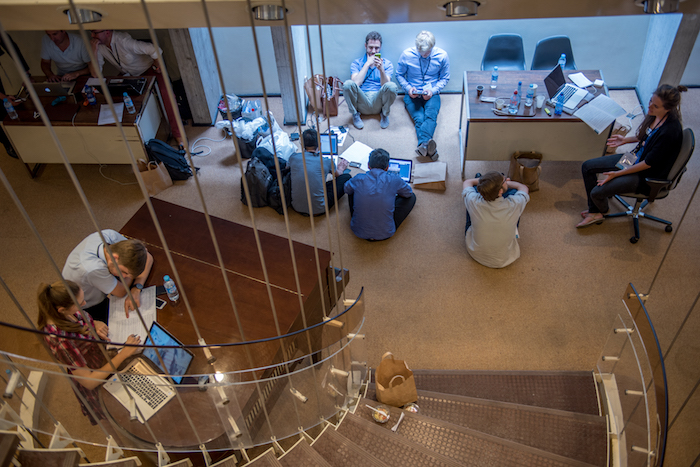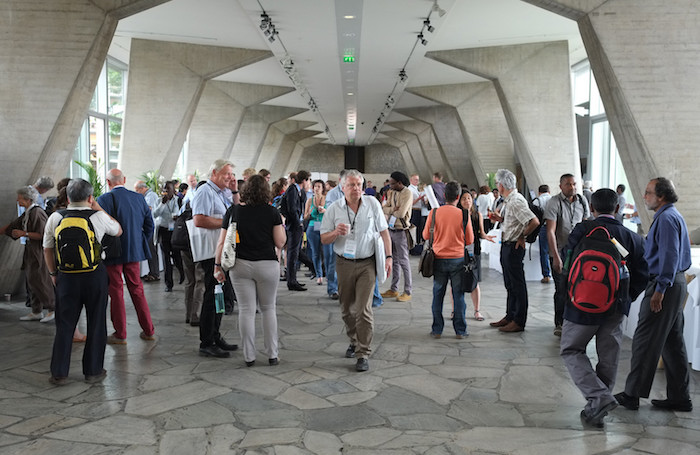Reflecting on Our Common Future Under Climate Change
Last year, a major scientific conference took place in Paris before the city hosted COP21 – the 21st United Nations Framework Convention on Climate Change Conference of the Parties. The event was titled “Our Common Future under Climate Change,” and it explored climate change in an innovative way: Almost 2000 scientists from 100 countries and across disciplines met for four days in July. They discussed not only the current state of climate science and its relationships to other global challenges and sustainable development, but also new ways of connecting science to policy and action – supporting science that can help policy-makers and people around the world to make "smart decisions" about the future.
Following COP21, many scientists have said that this sort of research is more important than ever if we want to cut down emissions substantially and implement the Paris Agreement – an international pledge to limit temperature increases from climate change to 2 degrees Celsius. In order to find solutions helpful for society as a whole, all different kinds of people need to be included in the process – not just scientists. That is why the conference explored climate change issues through integrated and inclusive approaches, underscoring the need for solutions that cut across sectors and systems and that join stakeholders and communities.
The conference was organized under the umbrella of the International Council for Science, Future Earth, UNESCO and major French research institutions with the support of the French Government.
Now, weeks after nations met again to officially sign the Paris Agreement, we talk to six researchers who sat on the Science Committee of the Our Common Future under Climate Change (CFCC) conference. They discuss why this new approach to research matters and how scientists can help nations to meet the ambitious goals they’ve set for themselves.

A small group of attendees engage in discussion in a quiet spot during the Our Common Future conference. Photo: INRA/C. Maitre
After COP21, is it more important than ever for scientists to take on Research that informs solutions to climate change and other modern challenges?
Karen O’Brien is a professor of human geography at the University of Oslo in Norway and a member of Future Earth’s Science Committee:
Yes – and we need a new type of science to do this. COP21 brought together diverse voices from around the world to demand and negotiate political responses to climate change. The basis for this growing global concern and mobilization comes from decades of scientific research identifying and assessing past, present and future impacts of human activities on the environment. Now, it is time for a large-scale collaborative effort between researchers and societal actors to meet the ambitions set at COP21. It is also time to focus on responses that address interrelated problems such as climate change, biodiversity loss, poverty, inequality and human insecurity. And it is time to focus on solutions that are equitable, ethical and sustainable.
We know that not all solutions to global problems are good ones; some will promote interests and ideas that create nothing more than illusions of sustainability. Some geoengineering proposals illustrate this well. One way to challenge these interests is to bring in a wider range of perspectives. To identify and facilitate transformative solutions, we need integrated research involving the natural and social sciences and humanities – research that challenges assumptions, crosses boundaries and fosters collaborations that engage people not just with the solutions, but as the solutions to global challenges.
Cheikh Mbow is senior scientist on climate change and development at the World Agroforestry Centre (ICRAF) in Nairobi, Kenya, and a member of Future Earth’s Science Committee:
COP21 was compelled by recognition of the urgent need for action given scientific evidence and policy relevant knowledge produced by IPCC and many other assessment groups during the last several decades. This evidence, which was highlighted during CFCC, shows significant progress in how scientists understand climate dynamics in their causes, consequences and prospects for solutions. COP21 articulated how climate change must be addressed through targeted actions on broader sustainability issues, and these actions cannot be well planned without salient science. Developing smart solutions for addressing climate change requires investigating complex issues of social transformation and behavioral change. It also means setting requirements in the short- and long-term for nations to implement policies and mobilizing resources for mitigating and adapting to climate change.
The climate-smart solutions discussed during COP21 should translate to meaningful and consistent low emission development and radical shifts in various sectors and regions. The new Intended Nationally Determined Contributions (INDCs) embed this political agenda of being serious about abating greenhouse gas emissions without compromising development. None of the options in the INDCs – conditional or not – can be achieve without science and only when policy drives scientific research. Surely, Paris showed a strong example of co-designing research priorities. But that is not enough. Now it is time to co-implement what we deem relevant for sustainable climate futures.
How can the solutions proposed during the conference help nations to meet the two degree target?
Purnamita Dasgupta is Chair in Environmental Economics at the Institute of Economic Growth at the University of Delhi in India:
The CFCC conference drew large numbers of participants who were interested in knowing about the future of planet earth, a future that is so dear to all human beings. I believe that one of the biggest contributions of the IPCC’s Fifth Assessment Report and the subsequent CFCC conference has been in uniting people from many different parts of the world. They are joined in the conviction that it is desirable to avoid climate change regardless of which part of the world you live in today. This is true no matter the challenges that your region faces in terms of socio-economic development and the kind of economic growth that you would like your country to achieve. The conference therefore provided a “stage” where all the “actors” felt convinced enough to participate in dialogue to determine how best to keep global warming within 2°C.
It was a forum where all the concerned delegates could listen to each other’s views on how climate change could impact lives and how it could be best kept within acceptable limits: a discussion that linked with real-world concerns on many related issues, including the Sustainable Development Goals (with special interest for developing countries) and nuclear energy (with equal if not greater concern for developed economies). The global shift from resistance to action to building effective resilience – it all came together in the CFCC conference.
Christopher Field is director of the Carnegie Institution for Science’s Department of Global Ecology in Stanford, California, in the United States:
Limiting warming to less than 2°C above preindustrial temperatures will require a wide range of actions across diverse sectors of society. The CFCC conference ambitiously acknowledged and embraced this diversity. The conference explored ways that contributions from governments, the private sector and civil society can interact constructively, leading to overall progress that is greater than the sum of the parts, or destructively, with major elements working at cross purposes. Some of the most exciting discussions involved ways that increased deployment of renewable energy technologies can yield benefits that go beyond the climate, ranging from increased manufacturing employment to improved health to more equitable energy access. Others concerned ways that investments in adaptation can also stimulate sustainable development.
CFCC made a compelling case that meeting the 2°C target is worth the effort. But it also painted a clear road map for ways to meet the target while also building robust economies and vibrant communities around the world.

Participants gather outside during the second day of the conference. Photo: INRA/C. Maitre
How can the scientific community apply the format and principles of the Our Common Future conference to future events?
Carolina Vera is the director of the Center for Atmosphere and Ocean Sciences (CIMA) and UMI/IFAECI, a joint institute of the University of Buenos Aires (UBA), Argentina National Council of Sciences (CONICET) and the National Center for Scientific Research (CNRS) in France. She also serves on the Science Committee of Future Earth:
CFCC was very successful in many different ways. But one of them worth of highlighting is that the conference offered the opportunity for open discussions about "moving from the problem space to the solution space" in regard to climate change. The conference made it possible by allowing an inter-disciplinary and multi-sectorial exchange of ideas and opinions. This strategy resulted not only in a comprehensive view of the climate change but also promoted thinking about the possible solutions.
This strategy of moving from problems to solutions in a co-discussion and co-design framework seems to be the right one – not only to address the climate change but to also tackle other issues like those identified in the Sustainable Development Goals. Such a strategy will be fundamental in future events that address these goals. Also, the right choice of speakers and discussants is crucial to motivate, surprise and challenge the vivid and active audience that meetings like these attract.
What can scientists do to better meet the needs of policy-makers in the arena of climate change?’
Hervé Le Treut is a professor at the University Pierre and Marie Curie in Paris and the Ecole Polytechnique in Palaiseau, France, and is the director of Institut Pierre Simon Laplace.
The recent Paris climate conference unanimously expressed the huge efforts that are needed to stabilize the climate of the Earth at levels that are only moderately more dangerous than the ones we have begun to experience now. The use of fossil fuels should disappear almost completely in a matter of decades. We need to develop alternative energy sources at the same rate, and we must also ensure climate justice through adaptation measures that will help the most vulnerable societies. Achieving all this requires complex decisions because climate change cannot be addressed separately from a wide range of other social, technological and environmental factors. Those decisions must also create a rupture: the aggregated contribution of nations would otherwise remain insufficient. To face this situation, an informed civil society is necessary, and the responsibility of scientists is huge because they have to collectively provide a continuous, multidisciplinary and trustful assessment of the situation on which citizens may rely. This constitutes a scientific challenge in itself, and also a condition for all future progress.
DATE
May 19, 2016AUTHOR
Claire WeillSHARE WITH YOUR NETWORK
RELATED POSTS
Spotlight on LMICs – Tired of Breathing in Pollutants? Time for Better Fuel Economy and Vehicle Standards
Future Earth Taipei Holds 2024 Annual Symposium
Spotlight on LMICs – The Future’s Juggernaut: Positioning Research as Anchors for Environmental Health